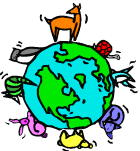|
Biodiversity
 Biodiversity has been defined by as "the total variety of life on Earth." This term can also be used to reflect the range of species at a site, the size of the gene pool, or even the number of different ecosystems on the planet. Biodiversity is important for sustainable development because it represents the wealth of biological resources available to us and future generations for food, clothing, medicine and housing. Currently biodiversity is being reduced by habitat destruction, air and water pollution and the introduction of foreign plants and animals. Biodiversity has been defined by as "the total variety of life on Earth." This term can also be used to reflect the range of species at a site, the size of the gene pool, or even the number of different ecosystems on the planet. Biodiversity is important for sustainable development because it represents the wealth of biological resources available to us and future generations for food, clothing, medicine and housing. Currently biodiversity is being reduced by habitat destruction, air and water pollution and the introduction of foreign plants and animals.
Reducing natural habitat destruction and promoting co-operation between countries are good ways of safeguarding the biodiversity that remains. Several nations have signed the Convention on Biological Diversity, which forms an international effort to conserve plant and animal species. Agenda 21 calls for governments to undertake national biodiversity assessments and formulate strategies to conserve and sustainably use biological diversity.
|

